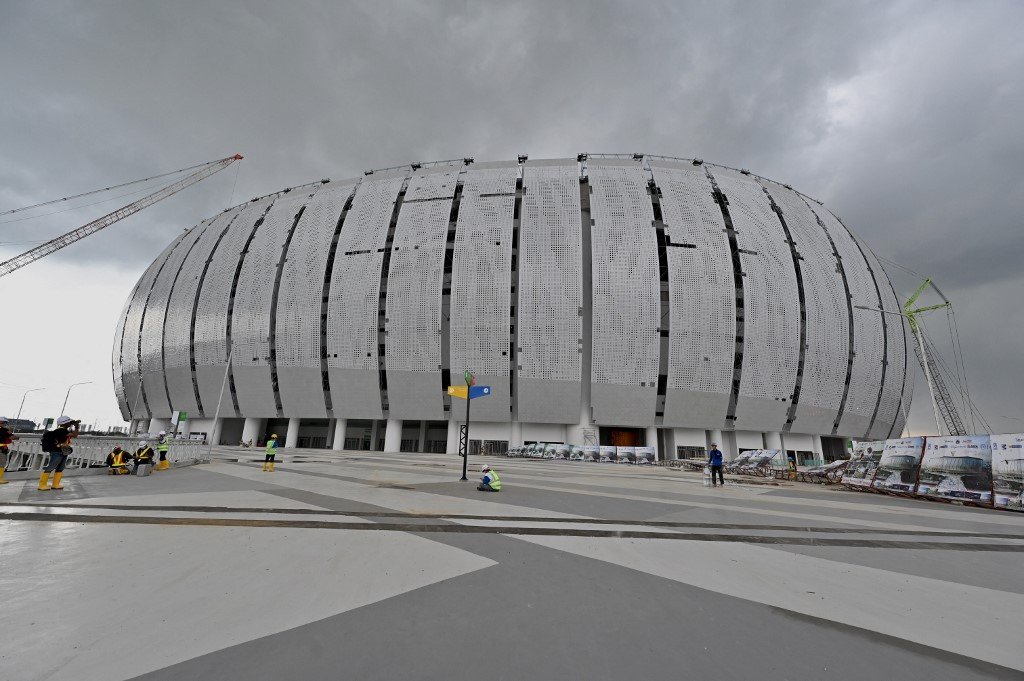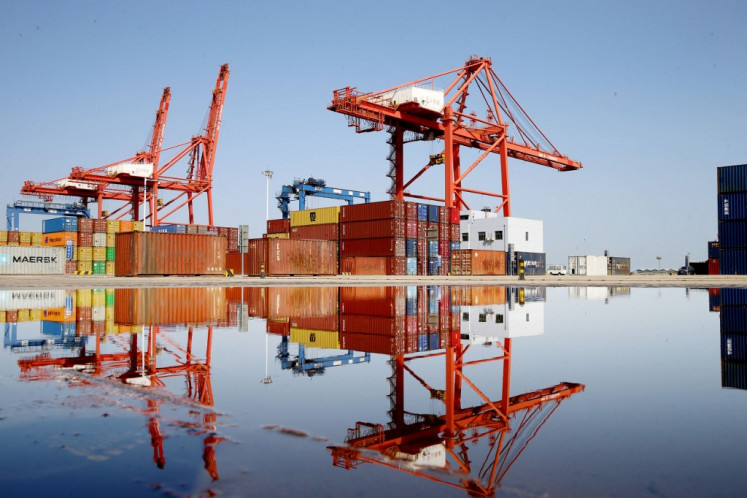Will Jakarta International Stadium ever get its moment in the sun?
Built on 26.5 hectares of land, the JIS has 82,000 seats, more than the capacity of GBK at 77,197. The multipurpose stadium is 73 meters tall with nine floors offering various facilities, including commercial space and parking.
Change text size
Gift Premium Articles
to Anyone

W
ith its state-of-the-art design and massive size, the Jakarta International Stadium (JIS) in North Jakarta has been designed as an alternative for the aging Gelora Bung Karno (GBK) Stadium in Senayan, Central Jakarta.
It looks like the JIS could fit the bill. Built on 26.5 hectares of land, the stadium has 82,000 seats, more than the capacity of GBK at 77,197. Also, the multipurpose stadium is 73 meters tall with nine floors offering various facilities, including commercial space and parking.
And at a cost of Rp 4.5 trillion (US$312 million), mostly drawn from the city budget, the stadium was certainly meant to attract international attention.
Yet, when Indonesia was appointed by the world football governing body FIFA to host the Under-20 World Cup, and the Indonesian Football Association (PSSI) unveiled the list of stadiums to host games in the tournament, the JIS was visibly absent.
It was passed up in favor of smaller and certainly less glamorous stadiums like Pakansari in Bogor, West Java and Manahan in Surakarta, Central Java. In the end, these smaller stadiums also failed to host the international tournament as FIFA decided to remove Indonesia as host for the U-20 World Cup following the controversy over participation from the Israeli national team.
Many have speculated that the reason the JIS did not appear on the list was simply because the stadium was a legacy project from former Jakarta governor Anies Baswedan, who currently runs as president with a platform of opposition to the policy of President Joko “Jokowi” Widodo’s administration.
While other, smaller stadiums continue hosting regular soccer matches in the wake of the U-20 World Cup fiasco, the JIS venue remains underutilized with its field only used occasionally for mass prayer and as a concert ground for rock bands to perform.
Last month, when it was announced that Indonesia would host the Under-17 FIFA World Cup, the prospect of the JIS hosting some games in a tournament was again back on the table.
As it happens, the JIS main rival GBK would be the concert venue of Brit-pop band Coldplay on Nov. 15, a scheduling conflict that will likely impact the venue's readiness to host matches for the tournament.
It was President Jokowi himself who floated the idea of using the JIS as venue for the U-17 World Cup.
"We will find a solution. GBK is not the only stadium we have. We have [the] JIS, Manahan [in Surakarta] and Jalak Harupat [in Bandung]," President Jokowi told reporters when asked for alternative venues for the U-17 World Cup.
Last week, Youth and Sports Minister Dito Ariotedjo also confirmed that President Jokowi had ordered the renovation of the JIS in anticipation of it being the venue for U-17 World Cup. "The President did ask for the renovation of [the] JIS so that it meets global standards," Dito said, as quoted by Kompas.com.
PSSI chairman Erick Thohir, who is also the State-Owned Enterprises Minister, has been less enthusiastic in the plan to commission the JIS in November.
On Monday, Eric said he would focus on renovating other stadiums in the country in preparation for the FIFA U-17 World Cup.
Erick told reporters that the PSSI would renovate 22 soccer stadiums to host matches for the U-17 tournament, scheduled for November of this year.
"Let's not focus on [the] JIS all the time. There are others stadiums that we need to check," Erick said, quoted by Kompas.com.
The state-owned enterprises (SOEs) minister also said the PSSI would wait for world soccer governing body FIFA’s recommendation before deciding whether to use the JIS in the tournament.
“Once FIFA comes, they will decide which stadium will be used. Before FIFA comes, what we can do is check the venue," Erick said.
Sports observer Anton Sanjoyo shared Erick’s cautious approach towards the JIS being used as a venue for a major tournament.
Anton said the JIS is simply not ready to host the Under-17 World Cup soccer championship, scheduled from Nov. 17 to Dec. 5.
“FIFA has yet to approve [the] JIS [as a venue for the U-17 World Cup],” Anton told The Jakarta Post on Tuesday, adding that he was not convinced the stadium would fulfill all the requirements needed to be recognized as a FIFA standard stadium within four months.
In the federation’s guidelines for stadiums, FIFA has 123 pages with over 400 points in its security and safety recommendation section.
“And it’s not just about the seating arrangement, the one-seat, one-number, or proper media room and hallway; there’s also a point on the environment that includes access,” said Anton.
According to FIFA standards, a stadium must have more than one access point for people to reach the gate area.
“As far as I know, out of two access points, in the west and east, [the] JIS only has one available.
“It is important to have more than one access point to avoid stampedes, and to give way to officials in emergency situations,” said Anton, who served as a member of a fact-finding team for the deadly Kanjuruhan stadium incident last year.
“[The] JIS also does not have any perimeter to separate those with tickets and those without, only Gelora Bung Karno has this. The perimeter is also crucial to avoid a stampede,” he added.









